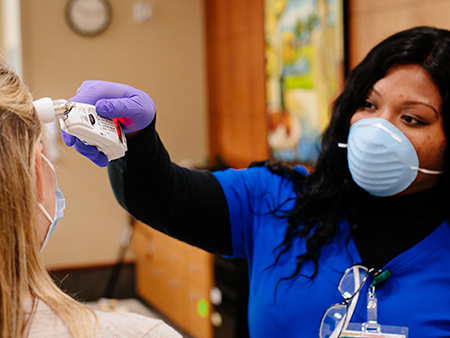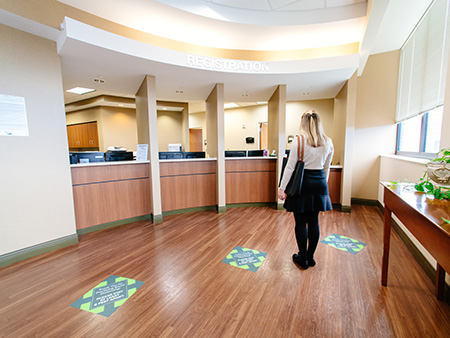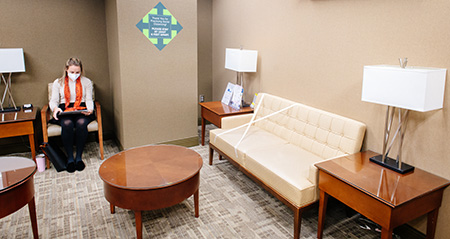 Photography: Steve WoodFor women across the world, the COVID-19 pandemic has caused a lot of uncertainty and confusion about safety when accessing care, in carrying and delivering a baby, during surgical or oncology visits, and more.
Photography: Steve WoodFor women across the world, the COVID-19 pandemic has caused a lot of uncertainty and confusion about safety when accessing care, in carrying and delivering a baby, during surgical or oncology visits, and more.
At UAB Medicine’s Women and Infants Center, providers, nurses and staff have taken all necessary precautions to foster an environment where continued care is as safe as possible for all patients.
“We understand the apprehensions that patients may have, but there is no reason for a woman to be concerned about visiting a UAB Hospital or a reason to skip critical care right now,” said Todd Jenkins, M.D., interim chair of the Department of Obstetrics and Gynecology at the University of Alabama at Birmingham. “UAB has always prided itself on providing a spectrum of world-class health care to women of all needs, and while this pandemic has not changed the quality of care provided, it has allowed us to implement new procedures and processes to make a woman’s visit even safer — such as enhanced cleaning measures of patient rooms and expanding OBGYN access at UAB Medicine sites in Gardendale and Hoover. Our patients can rest assured that they are coming to a facility with unmatched safeguards in place during uncertain times.”
Key new changes for patient safety
New changes that a patient can expect in outpatient and clinical visit settings include having one’s temperature taken before entering, express contact-free check-in and check-out options, social distancing visual aids, ample sanitation, reconfigured seating in waiting rooms, and mandatory mask-wearing during one’s visit, among other new initiatives.
In all inpatient and outpatient settings in the Women & Infants Center and UAB Medicine hospitals, enhanced attention to detail and cleaning processes have been implemented by UAB’s Environmental Services teams, ensuring that all surfaces, waiting areas and exam rooms are cleaned and sanitized to a standard approved by UAB’s Infection Prevention teams. This critical level of cleaning is particularly important, as patients range from pregnant women and those seeking routine care to gynecologic oncology patients and babies in its Regional Neonatal Intensive Care Unit.
Should a patient be admitted in an inpatient or surgical setting, they will be required to have a COVID-19 test administered and their status reported back to their physician.
Only patients with appointments will be allowed into clinic with exception in instances of compassionate care circumstances such as labor and delivery, adolescent gynecology, and high-risk obstetrical ultrasounds in the fetal care clinic, as well as patients seeking care for gynecologic oncology and treatment.
However, the UAB team knows there are certain special moments a patient wants to share or times when a woman may want the opinion of a partner or parent.
“Now more than ever, we know it is challenging to not bring a partner to a doctor’s visit or to not have friends visit after the birth of a baby,” said Brian Casey, M.D., division director of Maternal-Fetal Medicine. “We’re grateful for technology like FaceTime and Skype and have been able to incorporate those features into visits and experiences. Working with our patients to make sure they feel supported and included is a top priority for our teams, and we will do everything we can to cultivate those memories with them.”
 Photography: Steve WoodHaving a baby in COVID-19
Photography: Steve WoodHaving a baby in COVID-19
Having a baby is a special journey with milestones along the way that parents anticipate and look forward to. Whether it is seeing your baby in an ultrasound visit, undergoing infertility procedures, or delivering a baby in the labor and delivery unit, UAB has thought through and put into action new measures to maximize safety while maintaining the integrity of a patient’s experience.
“Our top priority is keeping mothers safe at all stages of pregnancy, and ultimately having a healthy birth experience from arrival to heading home as a family,” said Christy Nation, R.N., BSN, MSHA, senior director of Nursing in the Women & Infants Center. “When delivering, mothers can expect the same level of care and bonding experience with their new baby, and I’m proud of how our team here at UAB is rising to the occasion in trying times to provide above and beyond care for everyone we treat.”
As new mothers are allowed only one support partner, who must remain the same for their birthing and postpartum experience, mothers and partners are encouraged to bring everything they may need — in addition to standard “hospital bag” essentials — like extra comforts from home, phone chargers, books, toiletries, etc.
For moms-to-be who are still interested in taking prenatal classes, UAB is continuing to offer live classes via Zoom, allowing parents to engage and ask questions in real time.
According to the American College of Obstetricians and Gynecologists, there is not currently definitive data on the impact of COVID-19 on fertility, pregnancy, childbirth or transmission of disease to newborns. Current reports show that pregnant women do not have more severe symptoms than the general public, but researchers are still learning how the illness affects pregnant women.
As the virus spreads mainly from person-to-person contact, pregnant women can still incorporate key measures to keep themselves and their baby safe during confusing times:
- Washing hands often with soap and water for at least 20 seconds or cleaning hands with a hand sanitizer that contains at least 60 percent alcohol if you cannot wash them.
- Avoiding touching your eyes, nose and mouth.
- Staying home as much as possible.
- Staying at least 6 feet away from other people if you need to go out.
- Avoiding people who are sick.
 Photography: Steve WoodAccessing screenings, leveraging telemedicine care
Photography: Steve WoodAccessing screenings, leveraging telemedicine care
A trend that doctors do not want to see as a result of this pandemic is women rescheduling or delaying critical health screenings like mammograms or pap smears because they are worried about COVID-19.
“We are entering a phase where there is reason for concern that women may not visit their doctor for annual screenings for preventable cancers,” said Warner Huh, M.D., division director of Gynecologic Oncology at UAB. “Misinformation may hinder women from seeking routine checkup care that down the road could save their lives. There are some things that can’t be delayed, and knowing the status of your health is one of them.”
Huh assures women that, while it is safe to return to visit their OBGYN or primary care physician, they can also access telemedicine services as another means of care with their provider.
“Across UAB, we are employing telemedicine as a legitimate new standard care option for patients, and it’s a great way for patients of all backgrounds to have conversations with their doctor about their health or any concerns they may have before visiting for an in-office visit,” Huh said. “Across all divisions in the Department of OBGYN, our providers and staff are trained to use telemedicine routinely moving forward, which ultimately gives our patients even more access to our experts and care teams.”
A look ahead at women’s care
There may be aspects of COVID-19 that are still unknown; but a pandemic will not stop new families from forming, women from undergoing lifesaving cancer care, seeking relief from a urogynecology need or just for a routine yearly visit.
To Jenkins, measures put in place to safeguard the health of the women and babies in the Women & Infants Center is just one component of UAB’s continued dedication to patients.
“We know that it will be an evolving process to constantly update our standards of care as we learn more about COVID-19, but our patients can trust that any and all decisions we make at UAB are in the interest of protecting and preserving their health,” Jenkins said. “UAB is proud now more than ever to be a trusted leader and provider of care for women in our community.”